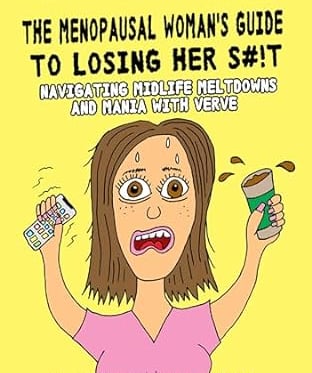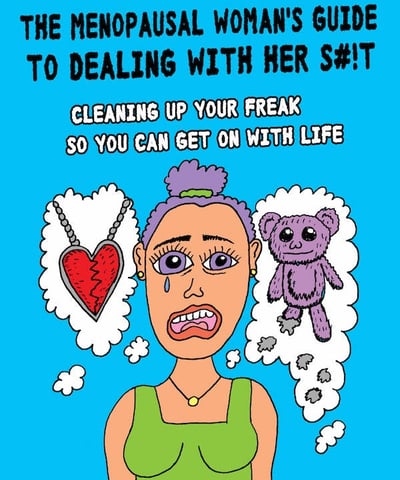Delusional in Menopause: Recognizing Signs & Symptoms
While delusional thinking in menopause is rare, it can affect some women with certain risk factors. Here's how to recognize delusions and who's at risk.
MENOPAUSAL MENTAL HEALTHMENOPAUSAL SYMPTOMS
Kennerly Clay
8/29/20245 min read


Can menopause make you delusional?
The decline in estrogen and progesterone production by the ovaries affect not just the reproductive system in menopause, but has wide-reaching effects on the body, including the brain. This hormonal shift is linked to a range of psychological symptoms, including anxiety, depression, irritability, and cognitive changes.
For some women, these psychological symptoms of menopause can be severe - even frightening. A very small percentage of women may feel like they're having a "psychotic break" while some others may experience paranoia and delusions, often requiring care for their mental health in menopause. Keep in mind, however, that delusional thinking in menopause is rare (in spite of the myriad effects of hormonal fluctuations on the brain). Here's how to understand the difference between menopausal delusions and symptoms of depression in menopause.
If you or someone you know is in crisis, please call 988, the Suicide & Crisis Lifeline in the United States.
What are delusions?
Delusions are false beliefs that are strongly held despite evidence to the contrary. They are often a symptom of severe mental health conditions like schizophrenia, bipolar disorder, or major depressive disorder with psychotic features. Delusions can manifest in various forms, such as:
Paranoid delusions - A woman might believe that others are conspiring against her, spying on her, or trying to harm her. For instance, she may think that her family members or neighbors are plotting to steal from her or that co-workers are spreading malicious rumors.
Somatic delusions - This involves a false belief that something is severely wrong with one's body despite medical evidence to the contrary. A woman might be convinced that she has a serious illness, like cancer, despite normal medical tests. She might also believe that parts of her body are rotting or that there are foreign objects implanted in her body.
Grandiose delusions - In this scenario, a woman might believe she has special powers, a unique talent, or a grand mission. For example, she might believe she is destined to save the world or has a unique ability that others do not possess.
Religious delusions - A woman might develop exaggerated or extreme religious beliefs that are not consistent with her usual belief system. For instance, she might believe she is a prophet or that she has a direct line of communication with a deity.
Jealous delusions - A woman might irrationally believe that her partner is being unfaithful, despite having no evidence. This type of delusion can lead to obsessive behaviors, such as constantly checking up on the partner, searching for non-existent proof of infidelity, or making unfounded accusations.
These delusions can be distressing and disruptive, both for the person experiencing them and for those around them. It’s crucial to seek medical and psychological help if such symptoms arise during menopause, as they could indicate a more serious underlying condition requiring treatment
The onset of delusions typically involves complex interactions between genetic predispositions, environmental factors, and neurological changes. Given this complexity, it's unlikely that menopause alone would cause delusional thinking. However, the psychological stressors associated with menopause could exacerbate pre-existing mental health conditions or trigger new psychological symptoms in people with a vulnerability to such conditions.
It's unlikely that menopause alone would cause delusional thinking. However, the psychological stressors associated with menopause could exacerbate pre-existing mental health conditions or trigger new psychological symptoms in people with a vulnerability to such conditions.
Delusions vs. other mental health symptoms in menopause
The hormonal fluctuations during menopause can significantly impact mood and cognitive function. Estrogen, in particular, has a protective effect on the brain, influencing neurotransmitters like serotonin and dopamine that regulate mood and cognition. As estrogen levels decline during menopause, some women may experience mood swings, memory lapses, and difficulty concentrating—symptoms often referred to as "menopause brain."
While these cognitive symptoms can be distressing, they are not typically indicative of delusional thinking. However, in women with a history of mental health disorders, the stress and hormonal changes associated with menopause could potentially trigger a relapse or worsening of symptoms, including the emergence of delusional thoughts.
It's important to differentiate between the cognitive fog and mood fluctuations of menopause and the more severe, fixed beliefs characteristic of delusions. Cognitive and emotional disturbances during menopause are generally temporary and linked to the body's adjustment to hormonal changes. Delusions, on the other hand, are persistent and often require medical intervention.
Cognitive and emotional disturbances during menopause are generally temporary and linked to the body's adjustment to hormonal changes. Delusions, on the other hand, are persistent and often require medical intervention.
Developing delusions in menopause: Risk factors
While menopause itself is unlikely to cause delusional thinking, certain risk factors can increase the likelihood of experiencing severe psychological symptoms during this time. These risk factors include:
Pre-existing mental health conditions
Women with a history of depression, anxiety, or psychotic disorders are at higher risk of experiencing a worsening of symptoms during menopause.
Family history of mental illness
A genetic predisposition to mental health disorders can increase the likelihood of developing delusions or other severe psychological symptoms.
High levels of stress
The physical and emotional stress associated with menopause, combined with external stressors such as family responsibilities or career pressures, can exacerbate mental health issues.
Lack of support
Women who lack social support or are isolated may be more vulnerable to the psychological impacts of menopause.
Addressing delusions during menopause
If you're experiencing severe psychological symptoms like delusional thinking during menopause, it's crucial to seek medical advice. A healthcare provider can assess whether these symptoms are related to menopause or indicative of a more serious mental health condition. Keep in mind that while it may seem like psychotic symptoms are associated with menopause, it's generally not menopause itself causing the symptoms. It's the myriad factors like genetics, past history and stress levels all working together to exacerbate what may have been pre-existing.
Treatment options may include hormone replacement therapy (HRT), antidepressants, or antipsychotic medications, depending on your symptoms and medical history.
Therapy, particularly cognitive-behavioral therapy (CBT), can also be effective in managing psychological symptoms during menopause. CBT helps individuals reframe negative thoughts and develop coping strategies to deal with stress and emotional disturbances.
It's essential to monitor your mental health in menopause and seek support if you experience severe psychological symptoms.
Books for women who are losing it in menopause
Mental Health
Losing your mind in peri/menopause?
The menopausal woman's guide series
Financial Health
Had enough of financial insanity?
Personal Growth
Triggers? Old stuff kicking up?
Related topics
Explore helpful articles, tips, and advice for women who are losing their shit in menopause.
Community
Stay Connected
© 2024. Eclectic Content, Inc. All rights reserved.






